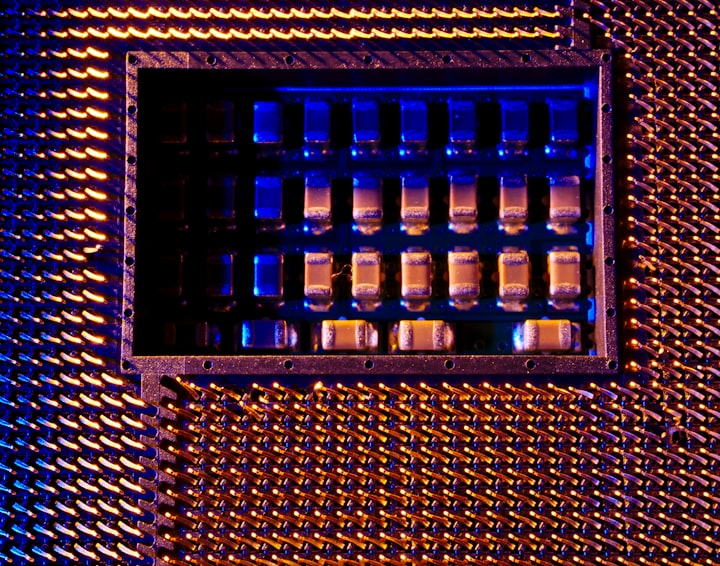
So, when testers see an unequal image of the output numbers, they have evidence that their quantum device has made the computer something I can do. Both Google and USTC used standard tests to test such chips, which included mimicking a quantum circuit and taking a random number sample of your output. IBM did not disclose the quantum volume of its recently released Eagle processor and said it had not tested its performance.
The Eagle chip is one step closer to IBM's goal of a 433-qubit quantum processor next year. By 2023, 1,121-qubit technology will be available, called Condor. These principles are similar to what the electronics industry has been doing for decades. "Miniaturize silicon chips," said Jerry Chow, head of the IBM Quantum Computing Experiment Group at the Thomas J. Watson Research Center in Yorktown Heights, New York. IBM's quantum computing project is an attempt to plan for the future beyond silicon semiconductors. Experts predict that silicon semiconductors will reach the physical limit of computer power in the next 10 to 20 years.
IBM has introduced a quantum computer chip with 127 qubits. The company says the chip cannot measure supercomputers and will open the way for quantum machines surpassing older computers in some workplaces in the next two years. IBM (International Business Machines Corporation) has introduced a new type of quantum processor called "Eagle", a company that believes it will surpass conventional computers in the next 24 months. The new chip is the largest quantum computing disc in history, at least on paper, with "qubits" or 127 qubits.
Quantum circuits are based on a quantum bit, or "qubit," similar to the old computer. Qubits can be in the quantum 1 or 0 position, or they can be in the upper range of 1 and 0 regions. If quantum memory is measured to determine whether a condition is a condition (this is known as a computer base measure), it can be zero, and this condition - is possible.
Combine these pairs of qubits and you have a powerful computer that can process numbers at unprecedented speeds, as long as there is a quantum algorithm (computer-based set of commands) you want to perform. The American-made Eagle quantum processor, a type of computer chip, comprises 127 qubits, from 66 recently acquired by the China University of Science and Technology (USTC) in Hefei.
In 2019, Google announced that its 53-bit Sycamore quantum processor is for the first time more than capable of operating on a traditional computer. In 2019, Google announced that its Sycamore processor, which uses the same superconducting architecture as its IBM counterpart, has acquired quantum-rich features - a name given to a time when quantum computers could solve an old computer problem that they might find impossible. IBM's 127-qubit Eagle processor is now ranked as the largest, and as a result, it is thought that the most powerful, most powerful quantum computer can be proven.
IBM claims to have exceeded 100 qubits and has reached a milestone that allows quantum to surpass conventional computer capabilities. If quantum computing reaches 1,000 qubits, it can achieve what IBM calls "quantum profit", that is, quantum computers always solve problems faster than ancient computers. After Eagle, IBM plans to use a machine called Osprey to reach 433 qubits by 2022.
IBM's first quantum chip contained more than 100 qubits, while previous models used 27 and 65 qubits. IBM has also released a preview of its next-generation quantum program Quantum System Two, which will provide greater flexibility when adding additional processors to the system. IBM CEO Arvind Krishna told Axios at HBO before the announcement was made that IBM had created a quantum processor that could process complex data so that it could not be processed or duplicated on a standard computer.
Many researchers believe that the first real use of quantum computers may be in specialized fields such as molecular modeling and mechanical engineering, mechanical engineering, and industrial problems, including finance. In 2018, IBM said the best old computers will be hit in the news in the next five years, and look at quantum length tests only as a possible future benchmark. IBM says the limit of quantum elevation - to do what the old computer cannot - has not yet been reached.
IBM was the first company to install quantum computing in the cloud, making the equipment available to more users. Google is known for reporting huge profits in 20191 using qubits created, for example, IBM, by superconducting circuits. This is a potential benefit of using ion-bound ions as qubits, as did IonQ, a study conducted by the University of Maryland at College Park that raised more than $ 600 million last month when it became the first quantum computer. public trading on the New York Stock Exchange - an agreement that informs the company about $ 2 billion.
John Martinis, a physicist who led the Google quantum computing project in Santa Barbara, California, declined to comment on the article, but some in the field believe it to be legitimate. Some researchers argue that the evidence is not so much computation as an attempt to make a quantum structure difficult to compare.
Since these problems are complete BQP, their fast classical algorithm will mean that no quantum algorithm provides hyperpolynomial acceleration, which is considered impossible. Compared with known classical algorithms, quantum algorithms provide high-speed polynomial algorithms that include Shor's factorization algorithm and calculation of different logarithms.





Comments
There are no comments for this story
Be the first to respond and start the conversation.